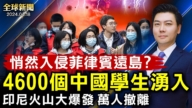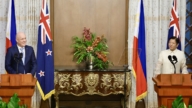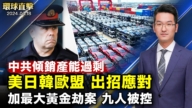【新唐人2013年04月27日讯】今年四月,在越南国会经济委员会组织的“春季经济论坛(Spring Economic Forum) ”,与会者抢着发言的现象,被越南经济学家黎登营(Le Dang Doanh)形容为“争论激烈”,他说,政府每年都向公众承诺,情况会更好,但老百姓看不到,这是信任危机。另外,曾担任越南两位总理顾问的阮福祥表示,如果一党治国的集权统治不改革,那么越南就会走向灭亡。
根据美国《纽约时报》报导,“越南共产党”面临日益增长的民怨和体制危机。而越共内部也出现分裂,党内两派针锋相对。一派是传统势力,希望延续越南的社会主义指导原则和越共的绝对权力,而另一派则呼吁体制多元化,并完全接纳资本主义。
政论家伍凡:“现在他们共产党跟社会脱节的非常厉害,老百姓非常强烈的要走西方自由民主这条道路,为什么?因为南越以前长期就是走资本主义、走自由化道路,现在他们统一以后,北方要把南方吃掉了,现在就斗争得非常凶,特别是党内斗争也好,社会的斗争也好,两派的斗争非常的激烈。”
身为马克思主义学者的阮福祥(Nguyen Phuoc Tuong),曾担任越南两位总理的顾问,他像许多越南人一样,不再信奉共产主义,并强烈谴责越南政府。他在接受《纽约时报》采访时表示,“现在,我们的体制是一党治国的极权统治,我自己出自这个体制,我了解这个体制的所有缺点、弊端及腐化现象。如果不解决这个体制的问题,它就会灭亡。”
现年77岁的阮福祥还表示,共产党内部的紧张局面随着经济状况日益恶化。今年2月,他帮助撰写了一份“致越共总书记的公开信”,信中敦促对越南的宪法进行改革,确保真正的权力属于人民。但没有得到回应。
对此,广州历史研究者钟波表示,不受人民监督的政府,在集权腐败之下,必然走向灭亡。
广州历史研究者钟波:“权力是一个腐蚀剂,谁要到了那一步都会上瘾的,以前毛泽东不是说了吗,苏联的今天就是我们的明天,所以呢,出现的那些贪腐、集权,然后腐败到死亡,这都是一个同样的过程,以前苏联也是这样腐败的,这都是历史的规律。”
“越南共产党”是越南唯一的执政党,直接掌控越南的行政、立法、司法各个部门、机构,越共党员担任各部门的政务职位。各级地方政府也都是由越共党员所组成。
越南问题专家卡莱尔•A•塞耶(Carlyle A. Thayer)对《纽约时报》说,现在越南的情况,对于领导层的批评“已经在全社会爆发开来”。他还说,在越南有种矛盾的现象,就是﹕异见者越发活跃,压制也是如此。
随着异见者的声音越来越多,越南政府也试图进行镇压。法庭将无数博客作者、记者和活动人士判处监禁,但是,批评声似乎有增无减。
据报导,越南的商人抱怨,越共实行的政府监管让他们不堪重负。而越南的房地产市场由于供过于求而陷入停顿,银行坏账负担沉重,报纸上满是失业率提高的文章,越南也被全球腐败观察机构“透明国际(Transparency International) ”列为腐败最严重的国家之一。
政论家伍凡表示,越南和中共有很多相似之处。
伍凡:“一个是社会不接受他们共产党的统治,二是经济下滑非常的厉害,这点跟中共非常相像,中国现在经济下滑了,引起社会矛盾,引起老百姓跟共产党的不满。”
然而,24号,越共中央书记处书记、中央检查委员会主任吴文裕,率领代表团前往中国上海,会见中共中央政治局常委王岐山,双方强调继续加强党际交流,和相互借鉴所谓“反腐倡廉经验”。
Vietnamese Communist Party Rule Teetering
In April, the Economic Committee of the Vietnamese
National Assembly organized a conference, the Spring Economic Forum 2013.
The participants were reportedly fighting to
make a speech.
The New York Times cited Dr. Le Dang Doanh,
a leading economist, saying it was “stormy.”
Dr. Doanh said that each year, the government
promises that Vietnam will be better-off, whilst the masses have never seen it.
“It’s a crisis of trust.” Nguyen Phuoc Tuong, former
adviser to two Vietnamese premiers, was also quoted.
He said that if the one-party rule in Vietnam
is not changed, “it will collapse on its own.”
The NY Times reported that the Vietnamese
Communist Party (VCP) is “facing rising anger over a slumping economy.”
Meanwhile, the party is “riven by disputes pitting
traditionalists who want to maintain the country’s
guiding socialist principles and a monopoly on power
against those calling for a more pluralist system
and with that new system a full embrace of capitalism.”
(Critic) Wu Fan: “The VCP has long isolated itself
from citizens.
The public have always longed to
take the path towards democracy. Why?
Because South Vietnam had adopted a capitalist system
and an economic liberalization policy before it was taken over by North Vietnam.
Since then, the dissent has intensified, and
two-force infighting has been very fierce.”
The article mentioned Nguyen Phuoc Tuong, a Marxist
scholar and former adviser to two Vietnamese premiers.
Like many Vietnamese, he “no longer believes in communism”,
and “strongly condemned the Vietnamese Government.”
Tuong told the NY Times, “Our system now is
the totalitarian rule of one party.
I come from within the system — I understand all its flaws,
all its shortcomings, all its degradation.
If the system is not fixed, it will collapse on its own.”
77-year-old Nguyen Phuoc Tuong also remarked that
the tensions inside the VCP “have been heightened
by the troubles with the economy.”
In February, he helped to write an open letter
to the VCP’s general secretary
In the letter, he urged “changes to the country’s constitution
that would ensure that real power belongs to the people.”
He has not yet got any response.
Zhong Bo, Guangzhou-based historical researcher,
comments.
A government, under no public watchdog but riven
with centralized corruption, will inevitably collapse.
Zhong Bo: “Power is corrosive and
people also become addicted to it.
Mao Zedong once said that,
“the Soviet Union’s today is our tomorrow.”
So it’ll go through the same process
as the Soviet Union did.
Firstly, corruption and concentration of power appeared.
Then, the system became rotten, until its final demise.
That is a law that repeats itself throughout history.”
The VCP is the sole ruling party in Vietnam. It controls all
the administrative, legislative and judicial sectors.
The VCP members steer all these departments and
lead local authorities.
The NY Times cited Carlyle A. Thayer,
prominent among foreign scholars of Vietnam.
He said that in today’s Vietnam, “criticism of the
leadership has exploded across all levels of society.”
“There’s a contradiction in Vietnam,
dissent is flourishing, and so is repression.”
In facing growing voices of dissent, the Vietnamese
government has tried to crack down.
“Courts have sentenced numerous bloggers,
journalists and activists to prison.
Yet criticism, especially online, continues
seemingly unabated,” said the newspaper.
The article stated that Vietnamese business people
complain of overbearing government regulations imposed by the VCP.
“The real estate market is frozen by overcapacity,
banks are saddled with bad loans.
Newspapers are running articles about
rising unemployment.”
Furthermore, Transparency International has ranked
Vietnam as one of the world’s most corrupt countries.
Wu Fan speaks about similarities
between the VCP and the CCP.
Wu Fan: “Firstly, the masses no longer accept the VCP’s rule;
Secondly, it faces a plummeting economy.
This is very similar to what the CCP faces in China. This has
fueled social conflicts and has ignited popular discontent.”
On April 24, a Vietnamese delegation arrived at Shanghai.
It was headed by Ngo Van Du, the VCP Central Committee
Secretariat, and Central Inspection Committee Chairman.
Ngo Van Du met with Wang Qishan, a member of
CCP Politburo Standing Committee.
Both sides reportedly claimed that they had strengthened
inter-party exchanges.
As well as having learned from each other’s “experiences on
combating corruption and building a clean government.”


























